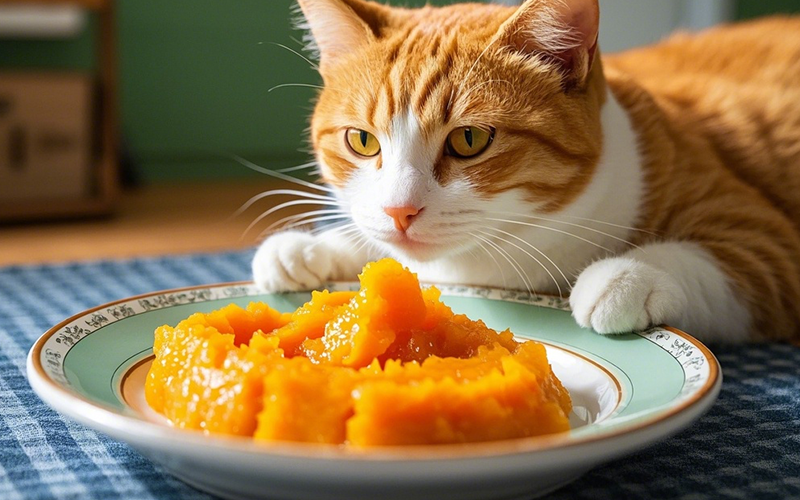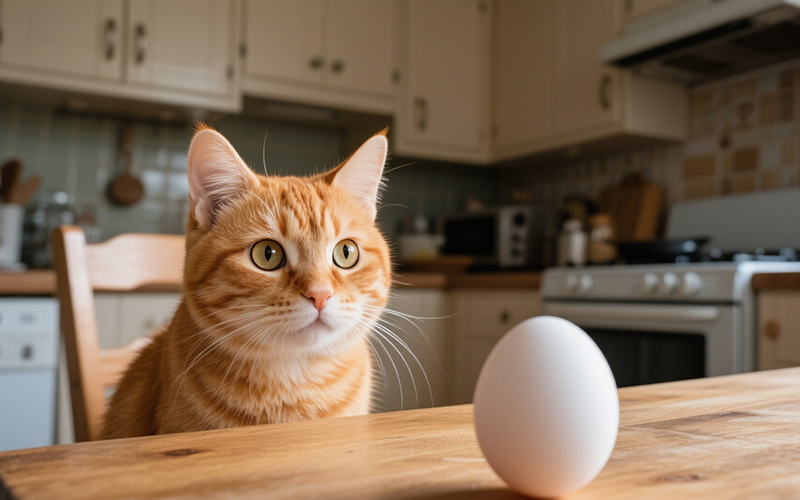Can Cats Eat Pumpkin Puree? A Guide to This Popular Treat for Cats
- 29 Mar 2025 11:12
Pumpkin puree is a popular ingredient in many pet foods and treats, and it’s commonly known for its benefits to both humans and pets. But if you're wondering, “Can cats eat pumpkin puree?” the answer is yes, in moderation! 🎃 Pumpkin puree can actually be a great addition to your cat’s diet, offering several health benefits. However, there are a few important things to keep in mind.

Benefits of Pumpkin Puree for Cats
Digestive Health: One of the most well-known benefits of pumpkin puree is its high fiber content, which can help with digestive issues in cats. It can assist with both constipation and diarrhea by regulating bowel movements. Fiber adds bulk to stool and helps your cat pass waste more easily, promoting a healthy digestive system. 🐾
Weight Management: Pumpkin puree can also help with weight management. The fiber in pumpkin makes your cat feel fuller without adding many calories. This can be helpful if you're trying to help your cat maintain a healthy weight or manage obesity. Just make sure to use it as an occasional treat rather than a primary food source.
Rich in Nutrients: Pumpkin is a source of essential vitamins, such as Vitamin A, Vitamin C, and potassium. These nutrients support your cat's immune system, skin health, and overall well-being. The nutrients in pumpkin are beneficial, especially if your cat’s diet is lacking in certain vitamins.
Important Considerations When Feeding Pumpkin Puree to Your Cat
Avoid Added Ingredients: When offering pumpkin puree to your cat, always opt for plain, unseasoned pumpkin puree. Avoid pumpkin purees that contain added sugar, spices (like cinnamon or nutmeg), or other ingredients like salt or artificial sweeteners. These can be harmful to your cat and cause digestive upset or toxicity.
Moderation is Key: While pumpkin puree can be beneficial, it should only be offered in small amounts. Too much pumpkin can lead to loose stools or other digestive problems. Start with a small teaspoon and monitor how your cat reacts. If they seem to enjoy it and have no negative side effects, you can occasionally offer more.
Consult Your Pet’s Health Needs: If your cat has specific health concerns or dietary restrictions, it’s always a good idea to check with a pet health professional before introducing new foods into their diet. You can also use PettureX, a pet AI software, to get instant advice and online consultations about your cat’s health. 📱
How to Serve Pumpkin Puree to Your Cat
Mix with Their Regular Food: You can mix a small amount of pumpkin puree with your cat’s regular food to encourage them to try it. Some cats enjoy the flavor and texture, while others may need a little coaxing.
Use as a Treat: You can serve pumpkin puree as a special treat, either on its own or as a topping for a meal. Just make sure you don’t overdo it—pumpkin should be a supplement, not a main ingredient in your cat's diet.
Frozen Pumpkin Puree: If your cat enjoys a bit of a challenge, you can freeze small portions of pumpkin puree in ice cube trays and offer them as a cool treat.
What Happens If Your Cat Eats Too Much Pumpkin Puree?
While pumpkin puree is safe for cats in small amounts, too much can cause digestive upset. Some signs that your cat may have eaten too much pumpkin include:
Diarrhea
Excessive gas or bloating
Lethargy
Loss of appetite
If your cat experiences any of these symptoms, cut back on the pumpkin puree and consult a pet health professional for advice.
Safer Alternatives for Cats
If you’re looking for other healthy treats for your cat, here are some options:
Cooked Meat: Chicken, turkey, or fish are great, protein-rich options that your cat will love.
Catnip: A fun and safe treat for many cats, offering stimulation and play.
High-Quality Cat Food: Stick to specially formulated cat food that provides all the necessary nutrients for your cat’s health.
Conclusion
In conclusion, pumpkin puree can be a healthy and beneficial treat for your cat, as long as it is plain, unseasoned, and given in moderation. The fiber, vitamins, and nutrients in pumpkin can support your cat’s digestive health and overall well-being. Just remember to avoid added sugars, spices, or other harmful ingredients, and always consult a pet health professional if you’re unsure about your cat’s dietary needs. For instant support and guidance, PettureX is a great resource to help you make the best choices for your pet. 🐾
Related

Can Cats Eat Egg Yolk Raw? A Vet's In-Depth Guide to Feline Nutrition & Safety
- 10 Jun 2025
Can Cats Eat Dog Kibble? Unpacking the Nutritional Mismatch!
- 29 May 2025
Can Cats Eat Deli Turkey? Slicing Through the Facts for Your Feline!
- 29 May 2025
Can Cats Eat Deer Meat? Exploring Venison for Your Feline!
- 28 May 2025
Can Cats Eat Corned Beef? Unpacking This Salty Human Delicacy!
- 28 May 2025
Can Cats Eat Cooked Rice? The Grain Truth for Your Feline Friend!
- 27 May 2025
Can Cats Eat Cornbread? A Crumb of Truth for Curious Cat Owners!
- 27 May 2025
Can Cats Eat Cooked Meat? Sizzling Facts for Your Feline's Feast!
- 26 May 2025
Can Cats Eat Chili? Spicing Up the Truth About This Human Dish!
- 26 May 2025
Can Cats Eat Chicken Eggs? Cracking the Code on This Feline Food Query!
- 24 May 2025
